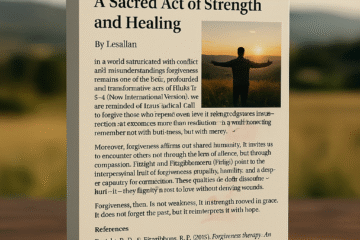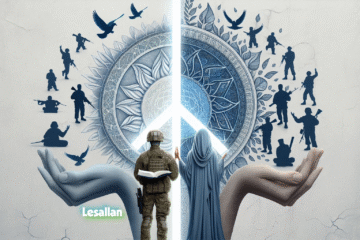April 12, 2025

Thought Journal #1
Lesallan Bostron
Ohio Christian University
PHL2000 Introduction to Philosophy (ONL25SP3)
Dr, Trent Lambert
April 12, 2025
Thought Journal #1
Reflecting on this week’s intellectual journey has been both exhilarating and demanding. As I engaged deeply with each discussion forum and reading, I experienced a synthesis of inner reflection and vigorous debate. The devotional reading of Psalm 46:10 (NIV) invited me to pause in the midst of turmoil—challenging my assumption that constant intellectual activity equates to progress. The verse’s timeless call to “Be still, and know that I am God” offered a counterbalance to the persistent busyness of daily thought, compelling me to embrace quiet reflection as a critical element of understanding (Psalm 46:10, NIV).
My contributions to the WK1 Plato Discussion further enriched this exploration. Plato’s insistence on ideal forms and the dialectical method urged me to consider knowledge’s abstract, almost ineffable aspects. While I initially struggled to reconcile Plato’s abstract idealism with my concrete experiences, the dialogue in the forum helped me see that striving for absolute truth—though fraught with uncertainty—is as essential to intellectual progress as any empirical inquiry. This tension between transcendent ideals and tangible realities compelled me to defend my viewpoints more rigorously, ensuring my claims were passionate and logically sound (Plato Discussion, 2025).
In parallel, the WK1 Aristotle Discussion provided a compelling counterpoint. Aristotle’s pragmatic approach and emphasis on empirical observation led me to explore ethical conduct and practical reasoning. The differences between Aristotle’s view—grounded in the particulars of everyday life—and Plato’s lofty abstractions deepened my appreciation for the complexity of thought. Engaging with both perspectives simultaneously was challenging; it demanded that I hold two seemingly contradictory views in productive tension. Successfully doing so has expanded my critical thinking skills, as it taught me to recognize that the most robust conclusions often arise from the interplay between different viewpoints (Aristotle Discussion, 2025).
My reading of Nash’s “Life’s Ultimate Questions” (1999) pushed this dialogue even further. Nash presented life’s profound dilemmas in ways that questioned the assumptions underlying both religious and philosophical narratives. His discussion about the interplay between faith and reason resonated with my earlier encounters with both scripture and classical philosophy. This text forced me to re-evaluate my internal narrative, balancing existential inquiry with the structured arguments I encountered in the discussion forums. Although I found certain aspects of Nash’s arguments challenging, the overall impact was a reinforced commitment to probing life’s deepest questions without settling for easy answers (Nash, 1999).
Throughout this week, I have learned that effective critical thinking is not about eliminating uncertainty or discomfort, but rather about engaging with it openly and using it to refine one’s perspectives. Defending my views required honesty about my limitations and a willingness to explore paradoxes. I now appreciate that the interplay between silent reflection, classical debate, and profound existential exploration forms the backbone of my evolving worldview. Through this integrated approach, I have begun to craft a thought process that is as resilient as it is inquisitive balance between the calm of divine reassurance and the dynamic rigor of philosophical inquiry.
This reflective entry is only the beginning. Looking ahead, I anticipate further challenges and insights as I continue to integrate these diverse intellectual traditions. Exploring how modern thought aligns with ancient wisdom promises to yield even deeper understanding in the weeks to come.
References:
Aristotle Discussion. (2025). WK1 course forum.
https://lms.ohiochristian.edu/d2l/le/content/21354/viewContent/484240/View
Nash, R. (1999). Life’s ultimate questions. Zondervan.
Plato Discussion. (2025). WK1 course forum.
https://lms.ohiochristian.edu/d2l/le/content/21354/viewContent/484237/View
Psalm 46:10 (NIV). The Holy Bible, New International Version.


